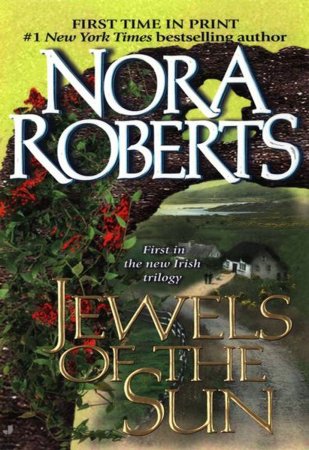First Impressions, page 1





To Georgeann,
neighbour and friend
Chapter One
The morning sun shot shafts of light over the mountains. It picked up the hints of red and gold among the deep green leaves and had them glowing. From somewhere in the woods came a rustling as a rabbit darted back to its burrow, while overhead a bird chirped with an insistent cheerfulness. Clinging to the line of fences along the road were clumps of honeysuckle. The light scent from the few lingering blossoms wafted in the air. In a distant field a farmer and his son harvested the last of the summer hay. The rumble of the bailer was steady and distinct.
Over the mile trek to town only one car passed. Its driver lifted his hand in a salute. Shane waved back. It was good to be home.
Walking on the grassy shoulder of the road, she plucked a blossom of honeysuckle and, as she had as a child, drew in the fleetingly sweet aroma. When she crushed the flower between her fingers, its fragrance briefly intensified. It was a scent she associated with summer, like barbecue smoke and new grass. But this was summer’s end.
Shane looked forward to fall eagerly, when the mountains would be at their best. Then the colors were breathtaking and the air was clean and crisp. When the wind came, the world would be full of sound and flying leaves. It was the time of woodsmoke and fallen acorns.
Curiously, she felt as though she’d never been away. She might still have been twenty-one, walking from her grandmother’s to Sharpsburg to buy a gallon of milk or a loaf of bread. The busy Baltimore streets, the sidewalks and crowds of the last four years might have been a dream. She might never have spent those four years teaching in an inner-city school, correcting exams and attending faculty meetings.
Yet four years had passed. Her grandmother’s narrow two-story house was now Shane’s. The uneven, wooded three acres of land were hers as well. And while the mountains and woods were the same, Shane was not.
Physically, she looked almost as she had when she had left western Maryland for the job in a Baltimore high school. She was small in height and frame, with a slender figure that had never developed the curves and roundness she’d hoped for. Her face was subtly triangular with its creamy skin touched with warm color. It had been called peaches and cream often enough to make Shane wince. There were dimples that flashed when she smiled, rather than the elegant cheekbones she had wished for. Her nose was small, dusted with freckles, tilted up at the end. Pert. Shane had suffered the word throughout her life.
Under thin arched brows, her eyes were large and dark. Whatever emotion she felt was mirrored in them. They were rarely cool. Habitually, she wore her hair short, and it curled naturally to frame her face in a deep honey blond. As her temperament was almost invariably happy, her face was usually animated, her small, sculpted mouth tilted up. The adjective used most to describe her was cute. Shane had grown to detest the word, but lived with it. Nothing could be done to alter sharp, vital attractiveness into sultry beauty.
As she rounded the last curve in the road before coming into town, she had a sudden flash of having done so before—as a child, as a teenager, as a girl on the brink of womanhood. It gave her a sense of security and belonging. Nothing in the city had ever given her the simple pleasure of being part of the whole.
Laughing, she took the final yards at a run, then burst through the door of the general store. The bells jingled fiercely before it slammed shut.
“Hi!”
“Hi, yourself.” The woman behind the counter grinned at her. “You’re out early this morning.”
“When I woke up, I discovered I was out of coffee.” Spotting the box of fresh doughnuts on the counter, Shane rolled her eyes and headed for them. “Oh, Donna, cream filled?”
“Yeah.” Donna watched with an envious sigh as Shane chose one and bit into it. For the better part of twenty years, she’d seen Shane eat like a linebacker without gaining an ounce of fat.
Though they had grown up together, they were as different as night and day. Where Shane was fair, Donna was dark. Shane was small; Donna was tall and well rounded. For most of their lives, Donna had been content to play follower to Shane’s leader. Shane was the adventurer. Donna had liked nothing better than to point out all the flaws in whatever plans she was hatching, then wholeheartedly fall in with it.
“So, how are you settling in?”
“Pretty well,” Shane answered with her mouth full.
“You’ve hardly been in since you got back in town.”
“There’s been so much to do. Gran couldn’t keep the place up the last few years.” Both affection and grief came through in her voice. “She was always more interested in her gardening than a leaky roof. Maybe if I had stayed—”
“Oh, now don’t start blaming yourself again.” Donna cut her off, drawing her straight dark brows together. “You know she wanted you to take that teaching job. Faye Abbott lived to be ninety-four. That’s more than a lot of people can hope for. And she was a feisty old devil right to the end.”
Shane laughed. “You’re absolutely right. Sometimes I’m sure she’s sitting in her kitchen rocker making certain I wash up my dishes at night.” The thought made her want to sigh for the childhood that was gone, but she pushed the mood away. “I saw Amos Messner out in the field with his son haying.” After finishing off the doughnut, Shane dusted her hands on the seat of her pants. “I thought Bob was in the army.”
“Got discharged last week. He’s going to marry a girl he met in North Carolina.”
“No kidding?”
Donna smiled smugly. It always pleased her, as proprietor of the general store, to be the ears and eyes of the town. “She’s coming to visit next month. She’s a legal secretary.”
“How old is she?” Shane demanded, testing.
“Twenty-two.”
Throwing back her head, Shane laughed in delight. “Oh, Donna, you’re terrific. I feel as though I’ve never been away.”
The familiar unrestricted laugh made Donna grin. “I’m glad you’re back. We missed you.”
Shane settled a hip against the counter. “Where’s Benji?”
“Dave’s got him upstairs.” Donna preened a bit, thinking of her husband and son. “Letting that little devil loose down here’s only asking for trouble. We’ll switch off after lunch.”
“That’s the beauty of living on top of your business.”
Finding the opening she had hoped for, Donna pounced on it. “Shane, are you still thinking about converting the house?”
“Not thinking,” Shane corrected. “I’m going to do it.” She hurried on, knowing what was about to follow. “There’s always room for another small antique shop, and with the museum attached, it’ll be distinctive.”
“But it’s such a risk,” Donna pointed out. The excited gleam in Shane’s eyes had her worrying all the more. She’d seen the same gleam before the beginning of any number of outrageous and wonderful plots. “The expense—”
“I have enough to set things up.” Shane shrugged off the pessimism. “And most of my stock can come straight out of the house for now. I want to do it, Donna,” she went on as her friend frowned at her. “My own place, my own business.” She glanced around the compact, well-stocked store. “You should know what I mean.”
“Yes, but I have Dave to help out, to lean on. I don’t think I could face starting or managing a business all on my own.”
“It’s going to work.” Her eyes drifted beyond Donna, fixed on their own vision. “I can already see how it’s going to look when I’m finished.”
“All the remodeling.”
“The basic structure of the house will stay the same,” Shane countered. “Modifications, repairs.” She brushed them away with the back of her hand. “A great deal of it would have to be done if I were simply going to live there.”
“Licenses, permits.”
“I’ve applied for everything.”
“Taxes.”
“I’ve already seen an accountant.” She grinned as Donna sighed. “I have a good location, a solid knowledge of antiques, and I can recreate every battle of the Civil War.”
“And do at the least provocation.”
“Be careful,” Shane warned her, “or I’ll give you another rundown on the Battle of Antietam.”
When the bells on the door jingled again, Donna heaved an exaggerated sigh of relief. “Hi, Stu.”
The next ten minutes were spent in light gossiping as Donna rang up and bagged dry goods. It would take little time to catch up on the news Shane had missed over the last four years.
Shane was accepted as an oddity—the hometown girl who had gone to the city and come back with big ideas. She knew that to the older residents of the town and countryside she would always be Faye Abbott’s granddaughter. They were a proprietary people, and she was one of their own. She hadn’t settled down and married Cy Trainer’s boy as predicted, but she was back now.
“Stu never changes,” Donna said when she was alone with Shane again. “Remember in high school when we were sophomores and he was a senior, captain of the football team and the best-looking hunk in a sweaty jersey?”
“And nothing much upstairs,” Shane added dryly.
“You always did go for the intellectual type. Hey,” she continued before Shane could retort, “I might just have one for you.”
“Have one what?”
“An intellectual. At least that’s how he strikes me. He’s your neighbor too,” she added with a growing smile.
“My neighbor?”
“He bought the old Farley place. Moved i
“The Farley place?” Shane’s brows arched, giving Donna the satisfaction of knowing she was announcing fresh news. “The house was all but gutted by the fire. Who’d be fool enough to buy that ramshackle barn of a place?”
“Vance Banning,” Donna told her. “He’s from Washington, D.C.”
After considering the implications of this, Shane shrugged. “Well, I suppose it’s a choice piece of land even if the house should be condemned.” Wandering to a shelf, she selected a pound can of coffee then set it on the counter without checking the price. “I guess he bought it for a tax shelter or something.”
“I don’t think so.” Donna rang up the coffee and waited while Shane dug bills out of her back pocket. “He’s fixing it up.”
“The courageous type.” Absently, she pocketed the loose change.
“All by himself too,” Donna added, fussing with the display of candy bars on the counter. “I don’t think he has a lot of money to spare. No job.”
“Oh.” Shane’s sympathies were immediately aroused. The spreading problem of unemployment could hit anyone, she knew. Just the year before, the teaching staff at her school had been cut by three percent.
“I heard he’s pretty handy though,” Donna went on. “Archie Moler went by there a few days ago to take him some lumber. He said he’s already replaced the old porch. But the guy’s got practically no furniture. Boxes of books, but not much else.” Shane was already wondering what she could spare from her own collection. She had a few extra chairs … “And,” Donna added warmly, “he’s wonderful to look at.”
“You’re a married woman,” Shane reminded her, clucking her tongue.
“I still like to look. He’s tall.” Donna sighed. At five foot eight, she appreciated tall men. “And dark with a sort of lived-in face. You know, creases, lots of bone. And shoulders.”
“You always did go for shoulders.”
Donna only grinned. “He’s a little lean for my taste, but the face makes up for it. He keeps to himself, hardly says a word.”
“It’s hard being a stranger.” She spoke from her own experience. “And being out of work too. What do you think—”
Her question was cut off by the jingle of bells. Glancing over, Shane forgot what she had been about to ask.
He was tall, as Donna had said. In the few seconds they stared at each other, Shane absorbed every aspect of his physical appearance. Lean, yes, but his shoulders were broad, and the arms exposed by the rolled-up shirt sleeves were corded with muscle. His face was tanned, and it narrowed down to a trim, clipped jaw. Thick and straight, his black hair fell carelessly over a high forehead.
His mouth was beautiful. It was full and sharply sculpted, but she knew instinctively it could be cruel. And his eyes, a clear deep blue, were cool. She was certain they could turn to ice. She wouldn’t have called it a lived-in face, but a remote one. There was an air of arrogant distance about him. Aloofness seemed to vie with an inner charge of energy.
The spontaneous physical pull was unexpected. In the past, Shane had been attracted to easygoing, good-natured men. This man was neither, she knew, but what she felt was undeniable. For a flash, all that was inside her leaned toward him in a knowledge that was as basic as chemistry and as insubstantial as dreams. Five seconds, it could have been no longer. It didn’t need to be.
Shane smiled. He gave her the briefest of acknowledging nods, then walked to the back of the store.
“So, how soon do you think you’ll have the place ready to open?” Donna asked Shane brightly with one eye trained toward the rear of the store.
“What?” Shane’s mind was still on the man.
“Your place,” Donna said meaningfully.
“Oh, three months, I suppose.” She glanced blankly around the store as if she had just come in. “There’s a lot of work to do.”
He came back with a quart of milk and set it on the counter, then reached for his wallet. Donna rang it up, shooting Shane a look from under her lashes before she gave him his change. He left the store without having spoken a word.
“That,” Donna announced grandly, “was Vance Banning.”
“Yes.” Shane exhaled. “So I gathered.”
“You see what I mean. Great to look at, but not exactly the friendly sort.”
“No.” Shane walked toward the door. “I’ll see you later, Donna.”
“Shane!” With a half laugh, Donna called after her. “You forgot your coffee.”
“Hmm? Oh, no thanks,” she murmured absently. “I’ll have a cup later.”
When the door swung shut. Donna stared at it, then at the can of coffee in her hand. “Now what got into her?” she wondered aloud.
As she walked home, Shane felt confused. Though emotional by nature, she could, when necessary, be very analytical. At the moment, she was dealing with the shock of what had happened to her in a few fleeting seconds. It had been much more than a feminine response to an attractive man.
She had felt, inexplicably, as though her whole life had been a waiting period for that quick, silent meeting. Recognition. The word came to her out of nowhere. She had recognized him, not from Donnas description, but from some deep inner knowledge of her own needs. This was the man.
Ridiculous, she told herself. Idiotic. She didn’t know him, hadn’t even heard him speak. No sensible person felt so strongly about a total stranger. More likely, her response had stemmed from the fact that she and Donna had been speaking of him as he had walked in.
Turning off the main road, she began to climb the steep lane that led to her house. He certainly hadn’t been friendly, she thought. He hadn’t answered her smile or made the slightest attempt at common courtesy. Something in the cool blue eyes had demanded distance. Shane didn’t think he was the kind of man she usually liked. Then again, her reaction had been far removed from the calm emotion of liking.
As always when she saw the house, Shane felt a rush of pleasure. This was hers. The woods, thick and touched with the first breath of autumn; the narrow struggling creek; the rocks that worked their way through the ground everywhere—they were all hers.
Shane stood on the wooden bridge over the creek and looked at the house. It did need work. Some of the boards on the porch needed replacing, and the roof was a big problem. Still, it was a lovely little place, nestled comfortably before woods, rolling hills and distant blue mountains. It was more than a century old, fashioned from local stone. In the rain, the colors would burst out of the old rock and gleam like new. Now, in the sunlight, it was comfortably gray.
The architecture was simple—straight lines for durability rather than style. The walkway ran to the porch, where the first step sagged a bit. Shane’s problem wouldn’t be with the stone but with the wood. She overlooked the rough edges to take in the beauty of the familiar.
The last of the summer flowers were fading. The roses were brown and withered, while the first fall blooms were coming to life. Shane could hear the hiss of water traveling over rocks, the faint whisper of wind through leaves, and the lazy drone of bees.
Her grandmother had guarded her privacy. Shane could turn a full circle without seeing a sign of another house. She had only to walk a quarter mile if she wanted company, or stay at home if she didn’t. After four years of crowded classrooms and daily confinement, Shane was ready for solitude.
And with luck, she thought as she continued walking, she could have her shop open and ready for business before Christmas.

























